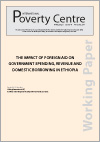
The Impact of Foreign Aid on Government Spending, Revenue and Domestic Borrowing in Ethiopia
Abstract:The main aim of this Working Paper is to assess the impact of foreign aid inflows on public expenditure, revenue and domestic borrowing in Ethiopia. The paper provides a literature overview of the fiscal effects of aid, and then applies a fiscal response model to Ethiopian data for the period 1964-2005. Since the empirical literature finds little evidence of common cross-country patterns, this highlights the important role that country-specific circumstances play in determining fiscal outcomes. By studying the particular fiscal dynamics in Ethiopia, the paper finds that foreign aid has had a positive impact on government investment, while its effect on current expenditure has been less pronounced. Moreover, by disaggregating aid inflows into grants and foreign lending, the paper is able to analyse their specific roles and impacts. The results support the conclusion that aid inflows increase public investment, with loans having a stronger impact than grants. Both aid grants and loans have a strong negative effect on domestic borrowing, suggesting that aid and domestic financing are close substitutes. Finally, the results also appear to support the hypothesis that higher aid flows displace domestic revenues. However, this particular finding does not seem to be robust across the sample.
This publication can also be founded in a condensed and/or expanded format: